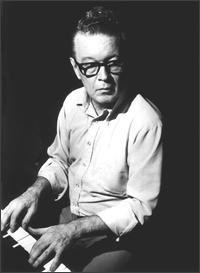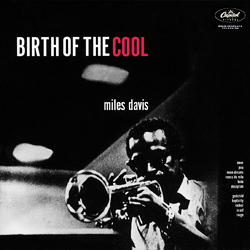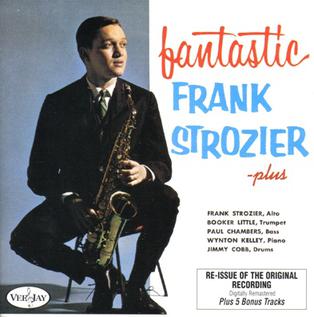Related Research Articles

Bebop or bop is a style of jazz developed in the early to mid-1940s in the United States, which features compositions characterized by a fast tempo, complex chord progressions with rapid chord changes and numerous changes of key, instrumental virtuosity, and improvisation based on a combination of harmonic structure, the use of scales and occasional references to the melody.

Charles "Charlie" Parker Jr., nicknamed "Bird" and "Yardbird", was an American jazz saxophonist and composer. Parker was a highly influential soloist and leading figure in the development of bebop, a form of jazz characterized by fast tempos, virtuosic technique, and advanced harmonies. Parker was a blazingly fast virtuoso and introduced revolutionary harmonic ideas into jazz, including rapid passing chords, new variants of altered chords, and chord substitutions. Primarily a player of the alto saxophone, Bird's tone ranged from clean and penetrating to sweet and somber.
Cool jazz is a style of modern jazz music that arose in the United States after World War II. It is characterized by relaxed tempos and lighter tone, in contrast to the fast and complex bebop style. Cool jazz often employs formal arrangements and incorporates elements of classical music. Broadly, the genre refers to a number of post-war jazz styles employing a more subdued approach than that found in other contemporaneous jazz idioms. As Paul Tanner, Maurice Gerow, and David Megill suggest, "the tonal sonorities of these conservative players could be compared to pastel colors, while the solos of [Dizzy] Gillespie and his followers could be compared to fiery red colors."

John Aaron Lewis was an American jazz pianist, composer and arranger, best known as the founder and musical director of the Modern Jazz Quartet.

Eli "Lucky" Thompson was an American jazz tenor and soprano saxophonist whose playing combined elements of swing and bebop. While John Coltrane usually receives the most credit for bringing the soprano saxophone out of obsolescence in the early 1960s, Thompson embraced the instrument earlier than Coltrane.

Alan Warren Haig was an American jazz pianist, best known as one of the pioneers of bebop.

Robert Roland Chudnick, known professionally as Red Rodney, was an American jazz trumpeter.

Birth of the Cool is a compilation album by American jazz musician Miles Davis, released in February or March 1957 on Capitol Records. It compiles eleven tracks recorded by Davis's nonet for the label over the course of three sessions during 1949 and 1950.

Milestones is a studio album by American jazz trumpeter and composer Miles Davis, recorded with his "first great quintet" augmented as a sextet. It was released in 1958 by Columbia Records.

Rhythm changes are a common 32-bar chord progression in jazz, originating as the chord progression for George Gershwin's "I Got Rhythm". The progression is in AABA form, with each A section based on repetitions of the ubiquitous I–vi–ii–V sequence (or variants such as iii–vi–ii–V), and the B section using a circle of fifths sequence based on III7–VI7–II7–V7, a progression which is sometimes given passing chords.
Charles Phillip Thompson was an American swing and bebop pianist, organist, composer, and arranger.

Miles Davis and Milt Jackson Quintet/Sextet, also known as Quintet/Sextet is a studio album by Miles Davis and Milt Jackson released by Prestige Records in August 1956. It was recorded on August 5, 1955. Credited to "Miles Davis and Milt Jackson", this was an "all-star" session, and did not feature any of the members of Davis's working group of the time. Jackie McLean only plays on his own compositions.

Art Pepper Meets the Rhythm Section is a 1957 jazz album by saxophonist Art Pepper with Red Garland, Paul Chambers, and Philly Joe Jones, who at the time were the rhythm section for Miles Davis's quintet. The album is considered a milestone in Pepper's career.
"Confirmation" is a bebop standard composed by saxophonist Charlie Parker in 1945. It is known as a challenging number due to its long, complex head and rapid chord changes, which feature an extended cycle of fifths. The harmonic rhythm of "Confirmation" is noted for its speed and intricacy, typical for the bebop era.
"Yardbird Suite" is a bebop standard composed by jazz saxophonist Charlie Parker in 1946. The title combines Parker's nickname "Yardbird" and a colloquial use of the classical music term "suite". The composition uses an 32-bar AABA form. The "graceful, hip melody, became something of an anthem for beboppers."

Breaking Point! is an album by trumpeter Freddie Hubbard, recorded on May 7, 1964, and released on the Blue Note label. Although it features performances by Hubbard's recent collaborators Ronnie Mathews and Eddie Khan, it was a departure in style from his work with Mathews and the Jazz Messengers.

Far Cry is a jazz album by musician Eric Dolphy with trumpeter Booker Little, originally released in 1962 on New Jazz, a subsidiary of the Prestige label. Featuring their co-led quintet, it is one of the few studio recordings of their partnership. It is also one of the earliest appearances of bassist Ron Carter on record. Dolphy took part in Ornette Coleman's Free Jazz session before recording this album on the same day. He had participated in the recording of Jazz Abstractions the previous day.

Redd's Blues is an album by the American pianist Freddie Redd, recorded in 1961 but not released on the Blue Note label until 1988.

Fantastic Frank Strozier is the debut album by American saxophonist Frank Strozier, recorded in 1959 and 1960 for Vee-Jay Records. The personnel includes the rhythm section from part of Miles Davis's Kind of Blue, recorded earlier in 1959.

Byrd at the Gate is an album by jazz guitarist Charlie Byrd, recorded at The Village Gate in 1963 and released on the Riverside label.
References
- 1 2 Gioia 2012, p. 303.
- ↑ Priestley, Brian (2005) Chasin' the Bird. Equinox. pp. 50, 209.
- 1 2 "Charlie Parker – Complete Savoy & Dial Sessions" (CD liner notes). Definitive Records. DRCD 44402.
- ↑ Cook & Morton 2008, p. 1115.
- 1 2 Gioia 2012, p. 302.
Bibliography
- Cook, Richard; Morton, Brian (2008). The Penguin Guide to Jazz Recordings (9th ed.). Penguin. ISBN 978-0-14-103401-0.
- Gioia, Ted (2012). The Jazz Standards. Oxford University Press.